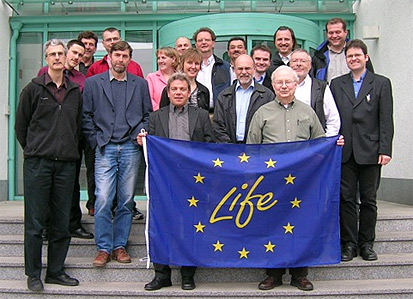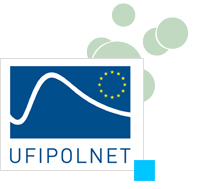Partner
 Leadpartner - Saxon State Agency for Environment and Geology
Leadpartner - Saxon State Agency for Environment and Geology Leibniz-Institute for Tropospheric Research
Leibniz-Institute for Tropospheric Research Czech Hydromoteorological Institute (CHMI)
Czech Hydromoteorological Institute (CHMI)  University Stockholm Department of Applied Environmental Science (ITM)
University Stockholm Department of Applied Environmental Science (ITM)  GSF-Institute
GSF-Institute TOPAS
TOPAS TSI Inc., Aachen
TSI Inc., Aachen
Leadpartner - Saxon State Agency for Environment and Geology
The Saxon State Agency for Environment and Geology (LfUG) is a scientific authoritity working for the ministry for environment and agriculture in Saxony (SMUL). The SMUL is consulted by the LfUG regarding issues of environmetal protection and geology. The LfUG cooperates via contracts with scientists with scientific institutions. It also contributes to formulate administrative regulations and directives. The LfUG deals with a couple of questions regarding air quality. The monitoring of air quailty is partly made of systematical analyses of data from the saxon air quality measuring network and its presentation. It also reports about all important sources of air pollutants and gases of the climate change. Additionally it modells the distribution of air pollutants in the atmosphere. The UBG department of measuring network air, monitors the air quality by running the air quality measuring network in Saxony. This department is a certified DIN ISO 9001:2000 and accredited DIN EN ISO/IEC 17025:2000 organisation. In project UFIPOLNET the LfUG is the leadpartner. It does the management and Dissemination as well as the interpretation of meausrements. The UBG does the practical measurements.

Leibniz-Institute for Tropospheric Research
The Institute for Tropospheric Research was founded in 1991 for the investigation of physical and chemical processes in the polluted troposphere (roughly the first 10 km of our atmosphere). Meanwhile a well-defined and globally unique research profile emerged with a focus on aerosols, i.e. small airborne particles, and clouds. Despite their minute absolute amount, aerosols and clouds are essential parts of the atmosphere because they control the budgets of energy, water and trace substances of the Earth System. The research interest in these highly disperse systems is stimulated foremost by their potenzial change through human activities. These system changes feed back into the anthroposphere not only through regional and global climate change but also directly through health effects of inhaled haze and fog particles.
Czech Hydromoteorological Institute (CHMI)
The Czech Hydromoteorological Institute (CHMI) is a central state institute of the Czech Republic in the fields of air quality, hydrology, water quality, climatology, and meteorology. The Institute is controlled by the Environment Ministry of the Czech Republic. The object of CHMI's activities are: To establish and operate stations for monitoring the atmosphere; process in an expert manner the results of observations, measurements and monitoring; carry out and coordinate scientific and research activities.
University Stockholm Department of Applied Environmental Science (ITM)
The Department of Applied Environmental Science (ITM) is multidisciplinary in its research and teaching, with a focus on society's impact on natural systems and processes. The research and teaching encompass the transport, fate and biological effects of environmental pollutants and trace substances, including the development and use of chemical, biological and physical methods as well as numerical models. ITM also provides external expert support to Swedish environmental authorities. ITM consists of four units: Analytical Environmental Chemistry Unit; Environmental Toxicology and Chemistry Unit; Aquatic Environmental Chemistry Unit; Atmospheric Science Unit. The Atmospheric Science Unit Studies of the effects of air pollution upon the environment. This includes the effects on both the indoor and outdoor environments and on human health, but also atmospheric effects such as aerosol-cloud interactions and climate.
GSF-Institute
The GSF focuses its research on one of the most important questions for society, the health of man in the environment. A couple of GSF-institutes have a long year expertise in the field of aerosol science. The main objective of the institute of Epidemiology is to examine the role of environmental influences and genetic predisposition on human health by using epidemiological methods. The goal of the research unit "Epidemiology of Air Pollution Health Effects" is to quantify the acute health effects of particulate air pollution. The focus is on the role of particles of different sizes and from different sources.
TOPAS
TOPAS is a company in the field of particle and aerosol technology. The capability comprises the development of innovative technical solutions and their production with highest quality standards. The company philosophy enables fast response to changes on the current market and realizing tailor made projects.
TSI Inc., Aachen
TSI Incorporated designs and manufactures precision instruments used to measure flow, particulate, and other key parameters in environments the world over. TSI serves the needs of industry, governments, research institutions, and universities, with applications ranging from pure research to primary manufacturing. Every TSI instrument is backed by unique technical expertise and outstanding quality.

